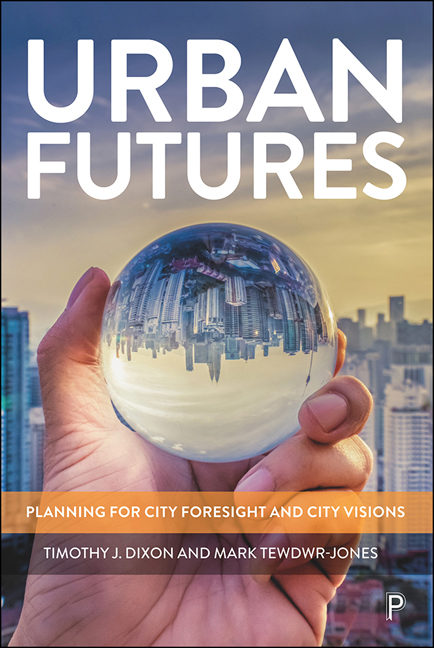Book contents
- Frontmatter
- Contents
- List of figures, tables and boxes
- Acknowledgements
- Foreword
- Preface
- 1 Urban futures: planning for city foresight and city visions
- 2 Cities and integrated urban challenges
- 3 Reimagining the city: views of the future from the past and present
- 4 Planning and governing the future city
- 5 Future narratives for the city: smart and sustainable?
- 6 Theoretical approaches to urban futures
- 7 Using city foresight methods to develop city visions
- 8 Shaping the future: city vision case studies
- 9 The innovative and experimental city
- 10 Visioning and planning the city in an urban age: a reality check
- 11 Conclusions: facing the urban future to 2050 and beyond
- Appendix: selected examples of city visions
- Notes
- References
- Index
Preface
Published online by Cambridge University Press: 21 December 2021
- Frontmatter
- Contents
- List of figures, tables and boxes
- Acknowledgements
- Foreword
- Preface
- 1 Urban futures: planning for city foresight and city visions
- 2 Cities and integrated urban challenges
- 3 Reimagining the city: views of the future from the past and present
- 4 Planning and governing the future city
- 5 Future narratives for the city: smart and sustainable?
- 6 Theoretical approaches to urban futures
- 7 Using city foresight methods to develop city visions
- 8 Shaping the future: city vision case studies
- 9 The innovative and experimental city
- 10 Visioning and planning the city in an urban age: a reality check
- 11 Conclusions: facing the urban future to 2050 and beyond
- Appendix: selected examples of city visions
- Notes
- References
- Index
Summary
The world that we live in is deeply urbanised and this is set to continue to grow over the long term to 2050 and beyond. Cities provide rich and diverse hubs of economic activity and continue to act as magnets for people and industry, yet they also harbour wealth and health inequalities, deplete valuable resources and contribute to continuing climate change. There have been many books written about cities, in fiction and non-fiction, and cities have permeated art and film, but there have been few, if any, previous books that have focused on the practical application and development of ‘city visions’, or the shared perspectives that can be produced to imagine a city's future.
Part of the inspiration for writing this book came from our strong desire to provide a counterpoint to the argument that ‘predictive’ city visions are impossible because: (a) of the complexity of cities; and (b) we ourselves, as part of that inherent complexity, are a crucial and unpredictable part of their future creation and design. But, in our view, it is now more important than ever that we look long term and that people help to decide what sort of future they want for individual cities across the world. This is not a prediction of the future and nor is it a generic vision designed by planning visionaries such as Ebenezer Howard and Patrick Geddes, inspirational though they were. What we call ‘urban futures’ is based on the notion that we need a practical and formal framework to imagine what our cities could and should be like to live, work and play in, in the long term (beyond 20 years); how they will operate; what infrastructure is needed; and how governance systems will be required to help shape them and ensure their resilience. To do this, we need to develop city visions that are based on participatory city foresight methods (or the science of thinking about the future of cities); and, as we also argue, we need to draw on ‘transitions theory,’ which emphasises how important city visioning is to the process of managing and planning for a sustainable (and smart) future for cities. In this book we therefore draw on our UK-based research (particularly in Reading and Newcastle) but also highlight international examples of city foresight and city visions.
- Type
- Chapter
- Information
- Urban FuturesPlanning for City Foresight and City Visions, pp. ix - xPublisher: Bristol University PressPrint publication year: 2021



